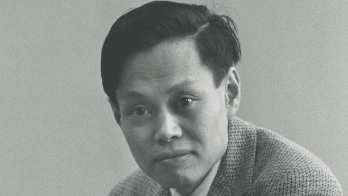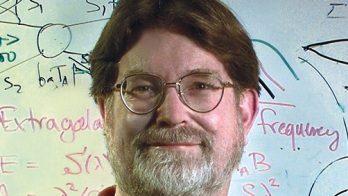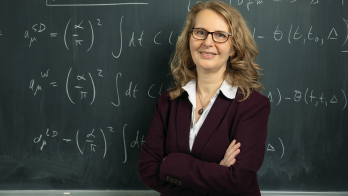The last of CERN’s founding fathers, a loyal supporter and a dear friend, passed away at age 103.
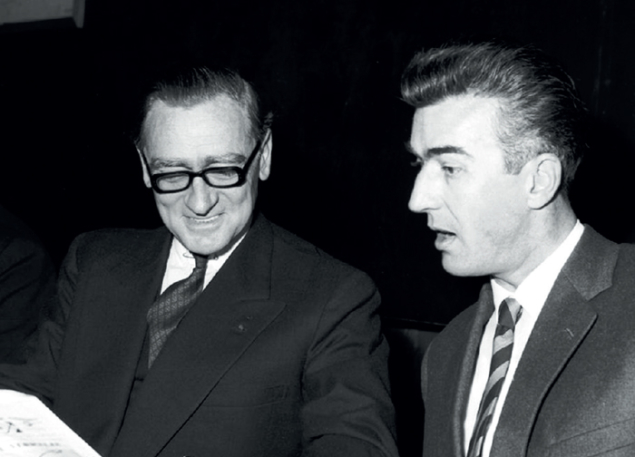
Image credit: CERN-HI-6002058.
Visionaries have the freedom of mind to shape the future when other people’s horizons are obstructed by the present. François de Rose was a visionary. In the aftermath of the Second World War, when Europe was in ruins and everything had to be rebuilt, the diplomat understood the importance of reviving fundamental research and, above all, of co-operation on a continental scale as the driving force of this ambition. In a Europe that was just starting to get back on its feet, it would be no mean feat. Nonetheless, François, alongside the prominent physicists of the time, put his energy into making this vision a reality. They lobbied governments for the creation of a centre that would work towards this goal and winning support, CERN was established in 1954 – an achievement of which François was extremely proud. “The result is even better than its founders hoped for,” he was often heard saying. His pride was even greater knowing that a visionary’s ideas, however strongly he or she believes in them, often take years to become reality and are sometimes never realized at all.
A strategist and a visionary to the end, François de Rose passed away on 23 March 2014 in Paris at the age of 103, having recently published his memoirs, Un diplomate dans le siècle. With his passing CERN has lost the last of its founding fathers, a loyal supporter and a dear friend.
Born in 1910 in Carcassonne in the south of France, he lost his right eye in a childhood accident, which prevented him from following the family tradition of a military career. His father, Charles de Tricornot de Rose, had been the founding father of combat aviation in France, the holder of the first military aviation licence, and had died in action in 1916.
After obtaining his baccalauréat, François embarked on a career as a diplomat and joined the French Embassy in London in 1937. He enjoyed recounting the splendid receptions that he attended at Buckingham Palace in the days when King George VI still ruled the British Empire and the future Queen Elizabeth II was just a child. Many years later, in the early years of the 21st century, it was fascinating to hear him tell anecdotes from his career of days long-passed, rather like reading an animated history book.
Presided by François, the first resolution for the creation of a European Council for Nuclear Research was adopted
During the Second World War, his fluency in English led him to serve as a liaison officer for the British military. However, it was after the conflict that his career took him down the route of European science – an unexpected detour for someone who had been discouraged by his maths teacher from pursuing a career in science. François was sent to the US to serve on the United Nations Atomic Energy Commission. There he met several renowned physicists, including the American Robert Oppenheimer, with whom he forged a friendship, and the Frenchmen Pierre Auger, Francis Perrin, Lew Kowarski and Bertrand Goldschmidt. François took up their cause. European physicists and some of their American counterparts were convinced that fundamental research in Europe needed to be brought back to life, and that this could only be achieved if the countries that had just been at war co-operated. The instruments that were needed to further the study of the infinitesimally small were particle accelerators, which were too expensive for any individual European country to build.
François and a handful of physicists embarked on a tour of Europe to appeal for the creation of the first European organization for fundamental research. Their objective was to pool resources for research to provide researchers with the tools that they needed and so curtail the brain drain. Pierre Auger, director of UNESCO’s Natural Sciences Department, organized an intergovernmental conference in Paris in 1951, presided by François, during which the first resolution for the creation of a European Council for Nuclear Research was adopted. The rest is history: CERN was established by 12 European states in 1954.
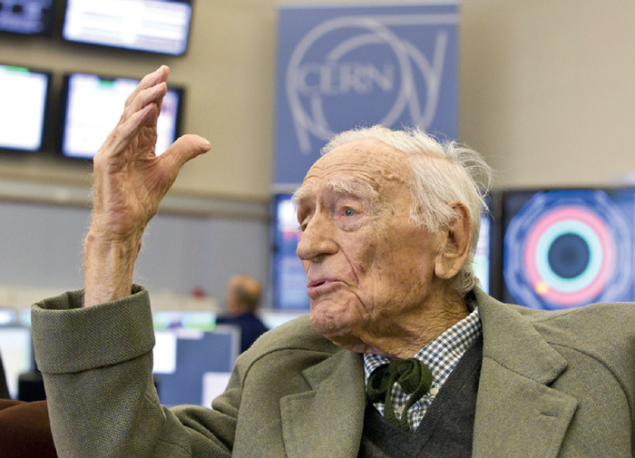
Image credit: CERN-HI-1011311 – 41.
François became France’s delegate to the CERN Council and later served as president of Council from 1958 to 1960. In this capacity, he gave a speech at the inauguration of the Proton Synchrotron (PS), which for a few months was the most powerful accelerator in the world. His visionary nature was evident in this speech, which he gave in front of an audience of well-known faces and legendary physicists including Niels Bohr and Werner Heisenberg. “The people who will meet here,” he said of CERN, “who will come from the member states and beyond to work together on a wholly peaceful and impartial mission, are united by the same passion for knowledge and subject to the same rules of utmost intellectual integrity.” Today, CERN welcomes researchers from all over the world and its membership has recently been opened to non-European states, but a few years after its founding, such an international future was still a long way off.
During his mandate, François negotiated CERN’s extension into French territory, which was agreed in a treaty signed in 1965. To commemorate his role in this milestone, CERN gave François a piece of rock drilled from the site, engraved with the words: “À François de Rose – La science ne connaît pas de frontières” (“To François de Rose – Science knows no borders”).
François continued to pursue his diplomatic career for many years. Notably, he served as the French ambassador to Portugal from 1964 to 1969 and as the permanent representative of France to the NATO Council from 1970 to 1974. He was well known as a specialist in defence and nuclear matters. For a long time, he was an eminent member of the London-based International Institute for Strategic Studies, whose expertise in international strategy and military matters is world renowned.
The diplomat would remain attached to CERN, which he described as “the most beautiful feather in my ambassador’s cap”. He continued to take an interest in and show his enthusiasm for scientific discoveries, even in his final years. In 2010, when he came to CERN to celebrate his 100th birthday, he promised to return when the Higgs boson was discovered – a promise that he fulfilled last year with a further visit to the laboratory. During this last visit, he expressed with modest sincerity his great admiration for the physicists that he met – a mutual admiration that led to some often comical exchanges of compliments.
François had a strategic vision for science, a vision that drove him to contribute to CERN’s creation in the hope that scientific collaboration between countries that had been at war would play a part in maintaining sustainable peace. A humanist, he always used CERN to counter the arguments of the Eurosceptics. When he met some members of the French parliament during his visit to CERN last year, at the height of the European crisis, he said to them: “When Europeans unite, they can do great things.”
Optimistic and full of energy, he performed some substantial feats even in his later years. To mark his 90th birthday, he played 90 holes of golf in one day, and when he was 96, he travelled around Cape Horn to Patagonia with his two daughters. He regularly had opinion pieces published in major daily newspapers. To those who asked if he had a secret for reaching 100 years of age, he responded that it had simply required “patience, because it took quite some time”. He never failed to display elegance with a touch of humour, which charmed those who spoke to him. During his last visit, he promised to come back for the next big discovery. “But you’ll have to be quick,” he joked, “I won’t be around forever.” Sadly, he was right again.






